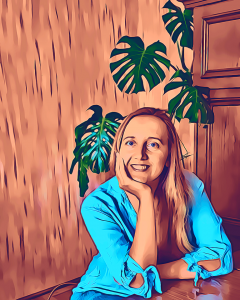208 Letter from Agnieszka Rydzik
 Dear Friends,
Dear Friends,
I have travelled a long way. You probably have too.
I grew up in the 80s in rural Poland. I was an introverted studious child who liked reading stories. My mum was a teacher so we had plenty of books at home but also there was little else to do and I was not exactly sporty back then. There were not many distractions in way of technology or gadgets in communist Poland, so books and stories were some of the more exciting things in an everyday world defined by shortages.
I come from a family of strong-minded and independent women. I grew up watching them challenge many social norms at home and beyond. This is something I carried on doing in my life albeit in different contexts and in different ways. Now, I see my younger sister conforming to even fewer norms and challenging even more. Ours is a continuation of the journey of the many women who came before us and paved the way for who we could become.
On my journey to where I am now – via several countries, degrees, universities – I have met many wonderful people who contributed to the shaping of who I am as a person and as an academic, starting from my university tutors, PhD supervisors, co-authors and mentors, to colleagues, students and friends from across the world. It is thanks to them I am able to navigate the linguistic, cultural and organisational norms.
I have spent over a decade in UK HE. In those years, I have felt fulfilled professionally and also there were times when I wanted to leave academia for good. I have more distance to all this now and am able to see a bigger picture. Maybe not all the time but most of the time. This ability to step back has not come to me naturally but was a conscious effort to reframe who I am and who I want to be.
I have seen many talented passionate colleagues and friends normalise overworking through feeling huge underlying pressure to work non-stop. This often comes at the cost of sacrificing private life, health, wellbeing, family. I was there too. I thought this was part of being in academia and that I did not have a choice. I saw many excellent academics with amazing potential burn out, lose joy in the work they do, and walk away. But I also met academics who were very successful, loved their work and also managed to have a life outside of academia. I decided to be in the latter group. This is still a work in progress for me (a lot to do with managing time, prioritising, letting go, fighting perfectionism, training myself to distinguish between work and out-of-work time, and most importantly, managing digital tools and not letting the inbox take over), but I am now in a better place than a few years ago. This balance, although extremely difficult to strike in a multi-dimensional role full of competing priorities and tight never-ending deadlines, I see as essential to building a long-term rewarding career in academia. I hope you can find this balance too.
It saddens me to see talented young researchers working 24/7 and feeling highly pressurised to produce high quality outputs right away (often before formally completing their PhD), get top student evaluations and generate research income; being on the verge of burning out before they even started; with no time or space to grow, develop ideas and find joy in what they do. This acceleration of expectations so early on scares me. I sit on interview panels, where competition is very high, interviewing many high performing young academics with outstanding outputs who have yet to secure a permanent role. I wish I could give them all a job, a hug and tell them to slow down, to take their time to develop and enjoy this stage of their career. But there is no time for this in contemporary academia. We need to think about how we can equip the next generation of early career researchers with adequate tools to navigate the multifaceted demands of academia. How can we build a better working environment for young researchers to prosper? How can we make academia a space to grow, develop ideas and reflect?
In my view, this largely comes down to the increasing overuse of easily accessible quantitative metrics for performance management (in teaching as well as research, by institutions as well as individuals). The question often is how many outputs, where were they published and how many citations but very rarely ‘why’ they were published. In this race, academics become incentivised into becoming fast-burning manufacturers of outputs and less often into slow-burning thought leaders and crafters of ideas. Increasingly, I come across examples of how imperfect metrics are used to judge talented individuals and teams. I see us constantly comparing ourselves, our performance and entering competition with the self and imagined others. It has been widely acknowledged that metrics are not a perfect measure, that they need to be used carefully and contextualised (for more information see the San Francisco Declaration on Research Assessment). Yet, it is so difficult to ignore the encroaching metricisation of our work (and also our lives – sometimes self-imposed). They say data can tell a story. Yes, to a certain degree it can. When used well. But metrics do not tell a personal story and are often given too much weight and not contextualised sufficiently. I see it used against researchers – depersonalising our complex stories, constantly telling us we are not good enough and unnecessarily setting us against each other. How do we work around this and not let metrics affect our sense of self and our goals? As metrics are now so omnipresent, we need to gain awareness and learn how to use them collectively to our advantage.
I see women, in particular ethnic minority and foreign-born women, working much harder (and being judged much harsher) to gain appreciation. They are often on the threshold of promotion or acceptance and yet an invisible, difficult-to-pinpoint barrier makes it difficult to cross the threshold. I sometimes get impatient and frustrated by this but more often than not I try to see it in the context of the long journey I, and we, have travelled.
Every journey is unique. Enjoy yours!

Best wishes,
Agnieszka Rydzik
University of Lincoln, UK

